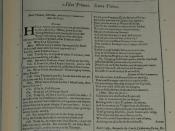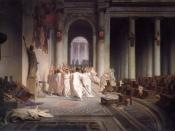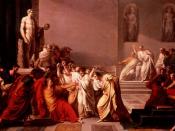Julius Caesar William Shakespeare a famous playwright of the 14th Century uses irony, Conflict and foreshadowing in his plays to enable the reader's curiosity to be excited to read. The use of foreshadowing throughout his plays makes the plays more Interesting to read. Foreshadowing, conflict, and irony is a important role in writing Plays.
The use of foreshadowing in the play Julius Caesar is used very much. For Example, Scene 1, Act 1 Marullus and Flavius conversation reveals deep - seated fears that Caesar is growing too powerful, too arrogant and must be stopped. This would be foreshadowing because the tribunes don't like Caesar any more and they have to do something do get rid of him. A conversation like this can result to something bad. In addition, In Act 1, Scene 2 A soothsayer tells Caesar to beware the "ides of March." In Act 2 Calphurnia, Caesar's wife, wakes Caesar up after herself awakening from a terrible nightmare.
She tells Caesar, that her dream foretells doom and succeeds in convincing Caesar not to go to the Senate which is the next day. This shows that trouble will occur in Caesar's future.
The way irony is used in this play is through the situation between the Soothsayer and Caesar. Although there are many other situational ironies this one has a particular meaning to it because it involves the mortality of Caesar. This situation starts off between the discussion of the soothsayer and the fortune teller.
The fortune tells Caesar not to go to the ides of March but Caesar ignores. Through Caesar's point of view this is irony because he didn't expect to be killed. In Addition to that irony there is irony between Caesar and Rome itself. This is irony because Caesar did a lot for his city and he loved it and he literally got stabbed in the back.
Conflict is also an important role in writing stories. When Caesar got stabbed by Rome a conflict was created. When the war starts that tells the reader that there is going to be a conflict because people die in wars. Cassius makes one of his soldiers kill him and that would also be a conflict. Cassius falls on a sword and dies toward the end of the story and after that Octavius announces that the war is over. This part is an important conflict.
William Shakespeare a famous playwright made Julius Caesar a great story.
He uses Foreshadowing, Irony, and conflict to make the story exciting to read and to make the reader want to read it all the way to the end. Shakespeare will always be known for his great stories.





